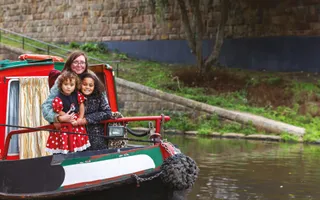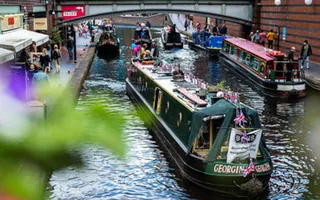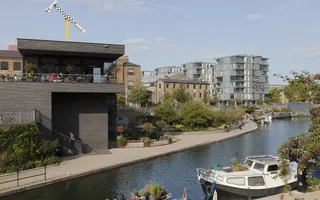As a charity, we are committed to proving the full breadth of impacts our waterways offer through our own and partnered research.
We’re the largest waterways charity, looking after 2,000 miles of canals and rivers across England and Wales. Our purpose is to achieve a sustainable future for our network, keeping it open and alive, making it resilient and safe, and maximising its value.
In order to do this effectively, we undertake our own research, along with collaborative efforts with research institutions and academics, to fully understand the impact of our waterways to society, the economy, and the natural and historic environment. Our findings aid both members of the public and organisations to support our cause.
Blue spaces and wellbeing
Our waterways are free public spaces enjoyed by over ten million people every year. Socially, they are a source of recreation, learning, and placemaking, contributing to people’s wellbeing.
We commissioned to Simetrica-Jacobs complementary research valuing the wellbeing impact of waterways. Most research on subjective wellbeing focuses on green spaces, so this work contributes to the literature by demonstrating the wellbeing value of engaging with blue spaces. Through this, it was also identified that a visit to our waterways delivers an average wellbeing value equivalent to £8.40 per person, in 2025 prices.
Led by King's College London, we also worked alongside Nomad Projects and J & L Gibbons to analyse data from waterway users who were asked to document in real-time their locations and state of wellbeing via the Urban Mind mobile app, for two weeks.
This unique study revealed that participants associated an increase in mental wellbeing for up to 24 hours after spending time by our waterways, which was stronger than time spent in purely green spaces such as parks.
Further insight into this study can be read in more detail in this journal.
Exercising by water
In partnership with the University of Birmingham Edgbaston Campus, we ran two group consensus workshops asking communities in Birmingham to analyse their local canal, identify why they chose to exercise there, and what barriers (if any) prevented them from doing so.
This study highlighted the importance of understanding community perspectives on the value of blue spaces. Going forward, it will enable us to ensure that resources are allocated in the most beneficial way, and help shape policy decisions aimed at enhancing community health and wellbeing.
Benefits to society and the economy
We've also spent time researching how our network is contributing to the transformation of urban and rural communities, and the potential it has to help address many societal challenges being faced now and, in the future – including water shortages, inactivity and loneliness.
In economic terms, the spending of the boating sector and towpath users lead to creation of employment and additional local economic activity. This in turn had effects on the wider economy through supply chains and workers spending.
The attractiveness of waterways is also reflected in the price premium that people are willing to pay to live close by, which encourages land value uplift and local economic regeneration.
Adapting to and fighting climate change
We believe our waterways can play an important role in mitigating the impacts of climate change, as well as playing a vital part in reducing greenhouse gas emissions, which are driving global warming.
You can deep-dive into the urban cooling effect of canals in cities, courtesy of a summary report provided to us by the University of Manchester.
Discover more
Learn more about the work we do to keep our canals open and alive, and the threats they face in the future.










